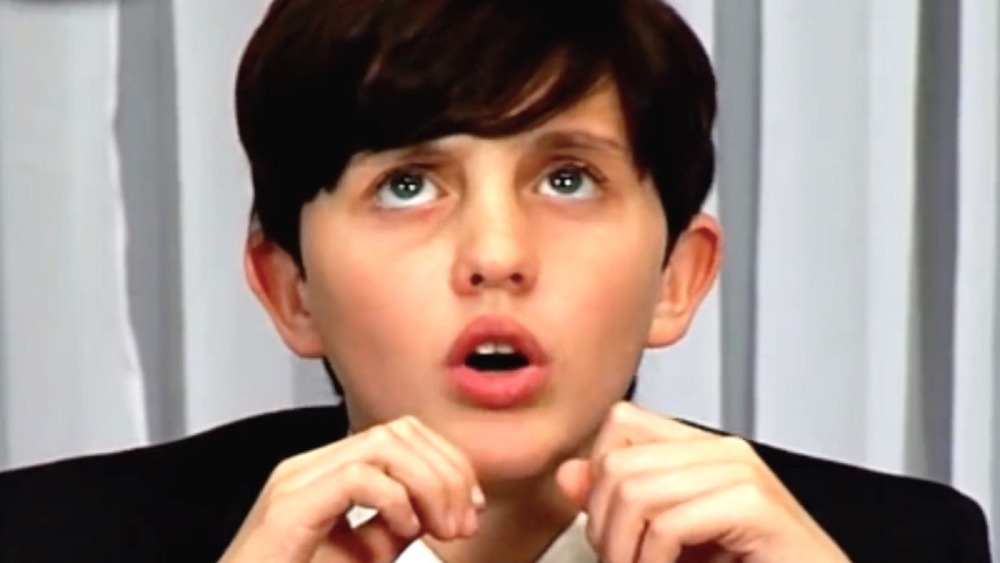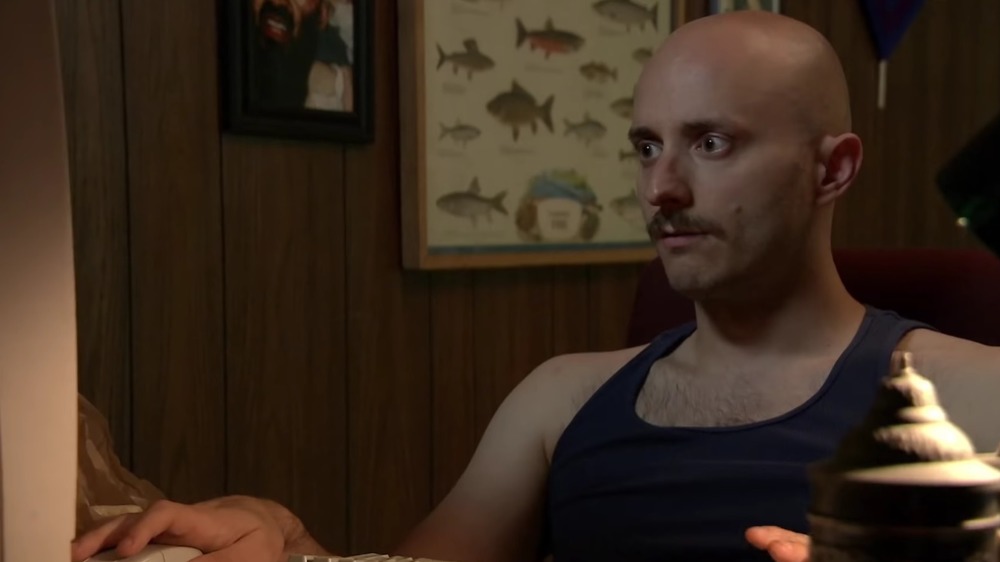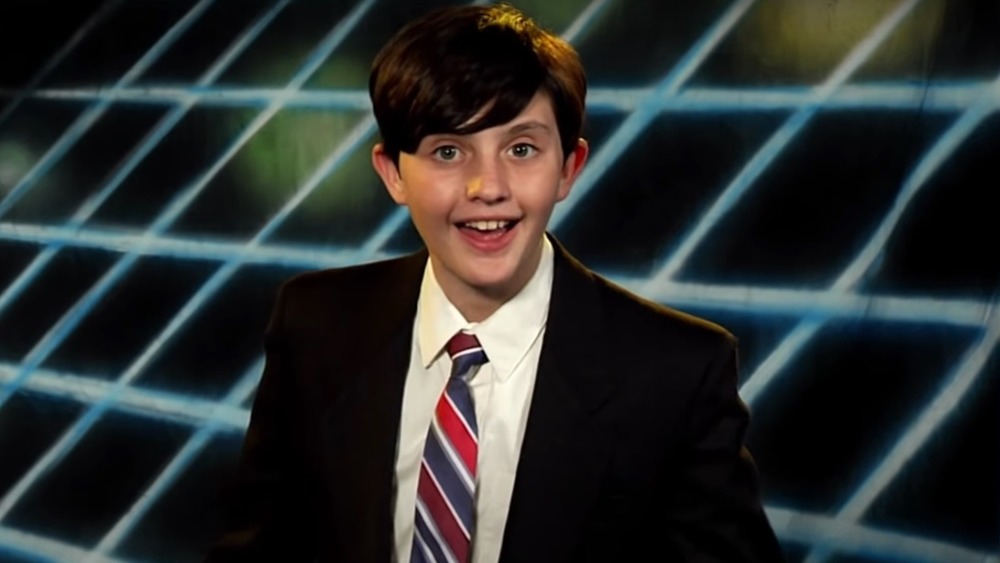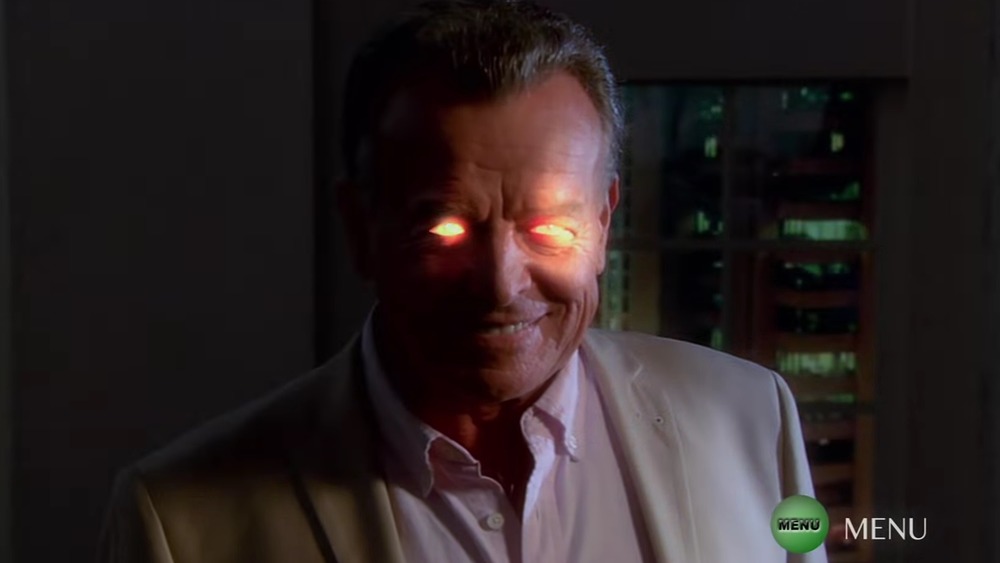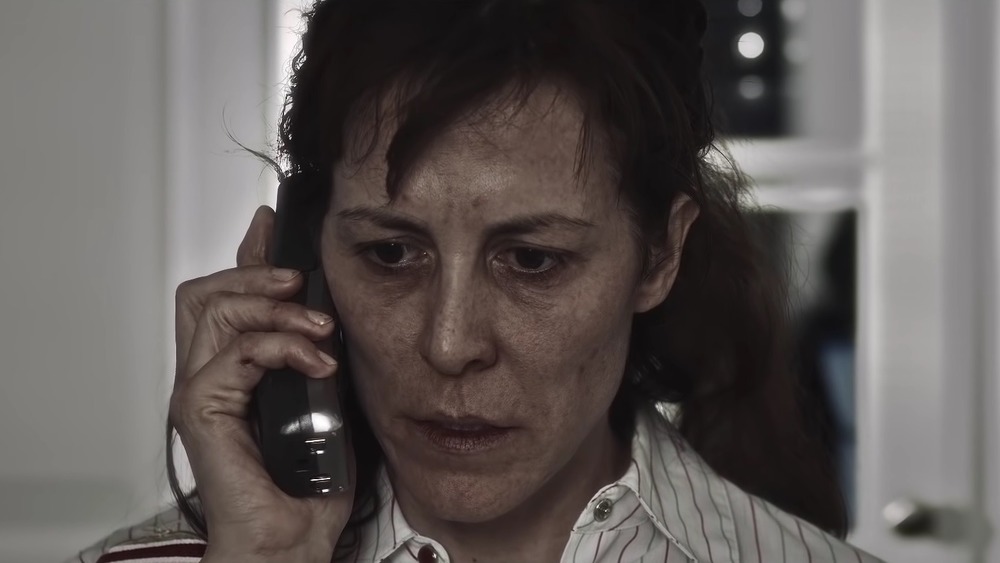Adult Swim's Most Disturbing Infomercials
Everyone has had trouble sleeping and, when we do, we're likely to plop on the couch, turn on the TV, and zone out to whatever happens to be on. Maybe it's an old, obscure movie or an episode of some half-forgotten TV show — or, more likely than not, one of those seemingly endless, repetitive infomercials, which usually feature too-excitable pitchmen babbling away about all of the amazing uses for their product, interspersed with breathless testimonials from people who are obviously paid actors. We may find ourselves wondering if anyone ever buys anything advertised by one of these spots, as our brains starts to gently fuzz over, inviting us to go back to bed. Or, if your TV happens to be tuned to Adult Swim — the after hours block of programming on Cartoon Network — you may instead find yourself wondering if you've woken up in some bizarre, threatening alternate dimension as your brain starts to send needles of fear down your spine, inviting you to never sleep again.
For the uninitiated, Adult Swim has, for some time now, aired short films at 4 a.m. that are specifically calibrated to screw with the minds of bleary-eyed viewers who happen to be awake and tuned in at that hour. They're nearly always presented with no introduction or context, and many of them take the form of infomercials that appear to be genuine at first, before segueing into material that is always off-kilter, usually surreal, and sometimes outright terrifying. Here are the oddest, most disturbing examples of the form — and the next time you end up lying awake in the wee hours of the morning, if you feel a temptation to check out what's on Adult Swim, don't say we didn't warn you.
There's something wrong with For Profit Online University
For Profit Online University is probably the most obvious parody of this bunch, a send-up of sketchy internet schools designed to take your money in exchange for letting you print out a worthless piece of paper saying that you've learned things. The "students" featured are full of weird non-sequiturs, the "professors" are proud to be "obsessed" with their students, and the circular fixation on profit — the school's motto is "Let's Profit Off Each Other" — simply makes no sense. Also, the school's main mode of currency — called "thoughtcoins" — seems to be good for buying Panera Bread sandwiches and nothing else. Early and often, though, there are references made to someone named Howard, who is absolutely not to be feared — "There's just no credible threat," one student bubbles — as long as you don't tell anybody your real name.
As it turns out, the school's virtual classrooms are populated not just with students' avatars, but with "data-harvesting ad-bots" — which are weirdly featureless, and prone to glitching in an unsettling fashion — that help prop the institution up financially. Unfortunately, it appears that one of those ad-bots, called H.O.W.A.R.D. (the acronym is never explained) has become sentient, and that the students must spend all of their time performing a menial task dubbed "digital gardening" in order to keep it from overwhelming the school's servers. The last couple minutes of the spot, though, makes it pretty clear that despite their best efforts and the decision of the faculty to try to placate the AI by giving it a ton of thoughtcoins, H.O.W.A.R.D. is anything but contained. Sign up for classes today!
Broomshakalaka is one killer tool for your home
If you happen to miss the first 30 seconds or so — in which a dead-eyed narrator flatly intones a "riddle" that should make your hair stand on end — the opening moments of Broomshakalaka play exactly like an honest-to-goodness infomercial for the latest quirky, niche home appliance. Well, almost: as the lights come on and our host Denny brightens up, he describes himself as an "amateur will writer and former father," which just doesn't sound good. Oh, he's also the inventor of the titular device, which has myriad functions ranging from the ridiculous to the incredibly dangerous. There to help him demonstrate are his "friends" Eileen (Jean Villepique from BoJack Horseman) and Mark (Randall Park of Ant-Man and the Wasp and WandaVision fame), but they really don't look too excited to be there. As the demonstration of the Broomshakalaka gets underway, their trepidation escalates to alarmed puzzlement, and then to abject terror as it begins grievously injuring its inventor.
Denny also makes frequent references to the daughter he used to have, and the number of brooms he needs to sell — two thousand, five hundred and fifty, to be exact — in order to offset the equivalent of "one human life." Denny soon breaks down and reveals that something awful happened to his child, and in the middle of his complete mental breakdown, Mark and Eileen — who have a tragic secret or two of their own — futilely attempt to keep the device from killing Denny and destroying the entire set. Meanwhile, the TV audience continues to buy units, as the "Brooms Sold" counter in the corner of the screen inexplicably rockets upward. Believe it or not, the spot pushes through all of the destruction and tragedy to find its way to a surprisingly happy ending — but to get there, you'll have to push through some pretty intense stuff.
Fartcopter is the last toy your kid will ever need
You wouldn't think it would get much sillier and lighter than a phony commercial for a toy called "Fartcopter," but boy, would you ever be wrong. Yes, the toy is just what it sounds like: a remote controlled helicopter with a speaker attached that makes fart noises (well, the same fart noise, over and over). But Fartcopter makes it clear that something is wrong here with its opening scene, in which a young boy whose birthday party is failing to please his friends gets savagely beaten by said friends while his parents look dispassionately on until Fartcopter arrives to save the day.
The spot then moves to a traditional infomercial set as a tween-aged British-accented boy named Michael (Gianni DeCenzo, who would go on to portray Demetri on Cobra Kai) extols the virtues of the toy. Intercut with his exclamations of "Wow, thanks, Fartcopter!" are segments of a testimonial from his parents, who relate a story of how their son became increasingly obsessed to the toy to the point that it stopped being funny and started becoming scary. We also hear from some other children who look absolutely terrified to be there, yet continue to read their scripted lines as their parents encourage them off-camera. We also learn a bit about the origins of the toy, which began, of course, as a lethal military drone.
Before long, Michael's parents — who just "want [their] son back," and to get him to stop speaking with that accent — drag him to a different set, where they've planned an intervention along with his disinterested sister, perplexed grandfather, and a picture of his grandmother, who was "too sad to come herself." The intervention appears to go well — until the spot's final, bloody moments, which will leave you with your jaw on the floor.
If you're watching Frank Pierre Presents: Pierre Resort and Casino, you might be dead
Frank Pierre Presents: Pierre Resort and Casino plays like an interactive menu one would find playing on the flatscreen at the titular getaway destination, hosted by Frank himself (Ray Wise of Twin Peaks). Frank made his fortune selling "pictures that when you stare at them long enough, you see other pictures," our first clue that there is something spectacularly off about this man and this place. Oh, sure, some of its odd touches seem harmless enough, like the swimming pool stocked with three swim-up bars and 13 dolphins; the on-site "hamburger grillery" that seems to serve everything but hamburgers; and "beautiful rooms with ornately decorated tables" for those who "don't eat food." But Frank would really like you to know that his is the only resort operating on Native American land that is not owned by Native Americans — "That's something I'm proud of," he says — and that despite what that might imply, the place is "one hundred percent not haunted by ghosts."
Of course, we soon begin to see evidence that this is not at all true; some of it is blatant, but other pieces come in the form of single frames inserted into shots that, when paused, reveal some genuinely disturbing images (seriously, don't do that if you're squeamish). The spot eventually moves to the casino, as a dealer named "Lucky" — who is anything but lucky — teaches us to play "Casino War," a lesson that is rudely interrupted by those pesky spirits who seem to be waging actual war on our sleazy tour guide. We conclude with Frank repeating three words that confirm what we've suspected all along, and one of those spirits admonishing us that, because we watched the video, we're going to suffer the same fate, a winking reference to a certain horror movie with a similar premise.
Unedited Footage of a Bear is pure nightmare fuel
Most of these infomercials, unnerving as they might be, contain at least some humorous elements — darkly humorous, to be sure, but funny nonetheless. Unedited Footage of a Bear, on the other hand, is simply the most horrifying thing Adult Swim has ever inflicted on its groggy audience. It opens as the title suggests: with a 30-second static shot of a bear, as an offscreen videographer comments on the size of its ears. Soon enough, we segue into a commercial for an allergy medication called Claridryl. A perky mom playing with her kids at a park tells us that parenting can be "like having to be in two places at once," but that she "[stands her] ground" with Claridryl, a drug that the narrator tells us "Targets where you're most vulnerable, acts immediately, and lasts indefinitely."
Soon, things become blatantly skewed — beyond the "Skip Ad" button, which has no place in a television ad. Our mom is now in her car, but the kids are nowhere to be seen and there are far too many empty Claridryl boxes in the back seat. Then the fine print at the bottom of the screen starts to offer increasingly disturbing advice about the medication's use, and, as the narrator's voice fades, Mom drives by what is obviously a horrific, violent crime scene. Then, she spots a sweater in the middle of the road — her sweater; the one she's wearing at that moment. She gets out of the car to investigate, and the abject madness begins.
There are no punchlines here, no winking asides. The implication of what has happened to this woman is as dark as it gets, and the spot's final shot — and Mom's whispered, repeated insistence "I don't have a gun" — will haunt you.
